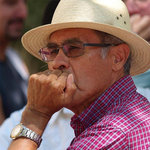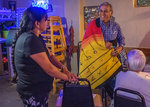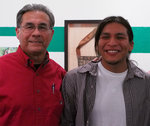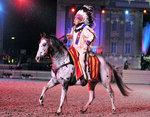Wind: 10.4 mph, S
Welcome to our new web site!
To give our readers a chance to experience all that our new website has to offer, we have made all content freely avaiable, through October 1, 2018.
During this time, print and digital subscribers will not need to log in to view our stories or e-editions.





After 25 years serving his tribal government in administrative jobs as a member of the Blackfeet Nation, Don Pepion was recruited to head New Mexico State University’s American Indian Program. Now after 22 years serving NMSU, including shepherding the construction of the American Indian Center and initiating Native American studies at the university, the anthropology professor is retiring June 30.
“Don developed the curriculum for the undergraduate and graduate minors in Native American studies, and made these learning opportunities available to all NMSU students across campus,” said Rani Alexander, anthropology professor and department head. “Don is also an international scholar who values experiential learning, and he brings a global perspective to the classroom as well as to field settings.”
In addition to spearheading the American Indian Center, Pepion’s work as the director of American Indian program over seven years resulted in a nearly 50 percent increase in the number of Native students attending NMSU at the end of his tenure as director. “The reason we were able to do that is because I worked collaboratively with a lot of the Indian tribes and especially the different programs within New Mexico State that provided us the resources to go out and do recruitment and work with the Native communities,” he said.
Pepion teaches that Indigenous groups from all over the world have basic shared views. Indigenous ways of knowing are connected to the natural world while Eurocentric knowledge or Euro Western knowledge is separated from the natural world.
“I teach philosophy of Indigenous people,” Pepion said. “Science is just now catching up to Indigenous knowledge or what was labeled ‘primitive’ knowledge. Indigenous people would say everything is alive, even the rocks – so-called inanimate things. Scientists would say that’s a primitive thought. But it’s really not, it’s actually right because through quantum theory we have learned that it’s true.”
Pepion was part of the team on a three-year federal grant project partnering with other universities in Canada, the United States and Mexico through field schools and study abroad programs where students had opportunities to visit with First Nations communities and learn firsthand about Indigenous perspectives on political, cultural and environmental issues.
“I've always had an educational philosophy of raising the consciousness of all people regarding the Native American situation,” Pepion said. “To help improve the quality of living for Native American people, that’s really the bottom line, and I think the way to that as I found both as an administrator and as a teacher is that everything starts with awareness and education. You can't change what you don't know until people are able to learn about the situation and they can make better choices.”
One of the NMSU anthropology students who went to Canada as part of the three-country exchange project was Ben Shendo, who now teaches culinary arts and Brazilian martial arts at the Native American Community Academy in Albuquerque.
“Don was a big game-changer,” said Shendo, a member of the Jemez and Cochiti Pueblo, New Mexico. “I went into anthropology because him. He kind of took me under his wing. So, where I'm at right now in life wouldn't have been all without Don, you know. He’s one of those founding people that shape your life, that you always reflect on, you pray for and you think about. I'm just one story of many lives that Don has influenced.”
Shendo used Pepion’s teaching as a springboard to a life of learning. In addition to Canada, Shendo traveled extensively, adding to his knowledge of martial arts in Brazil and learning indigenous cooking in Minnesota. During one of his trips from Albuquerque to Brazil, he stopped at NMSU to speak in Pepion’s class and met his future wife, Sibella Salazar, who recently earned her Ph.D. at NMSU in counseling psychology and is teaching a course in multiculturalism.
Another of Pepion’s graduate students Kayla Meyers, originally from Wyoming, describes herself as “mixed race white and Eastern Shoshone.” She is now a social studies teacher at Alma d'arte Charter High School in Las Cruces, teaching Native American studies, ethnic and gender studies, Spanish and world history. She was drawn to NMSU to earn her master’s degree to research the Indigenous experience in the borderlands.
Pepion served on Meyers’ thesis committee, but his influence went beyond the classroom.
“His teaching was powerful and completely changed my life, without exaggeration,” Meyers said. “He teaches from the basis of humanism and liberation of the students. Instead of trying to fill us with information, he built an environment and a pathway for us to actively discover our own liberation.
“I found peace in my identity as a mixed person for the first time in my life. I finally had words to describe my Indigenous worldview and to fill in the cracks left in my heart by a colonized world. He was the first teacher to point me towards my own healing.”
Miriam Chaiken, anthropology professor Emerita and retired dean of the NMSU Honors College, worked in the anthropology department with Pepion. “Don is an effective and inspirational educator who brings his formal education and his own cultural background to his classes, so the students get the best of both worlds,” Chaiken said. “His work has inspired many students to embrace their Indigenous traditions while also pursuing opportunities in higher education. He has truly transformed students' lives, and helped them achieve their goals. That is an amazing legacy.”
Several colleagues mentioned one event that Pepion was too humble bring up. The professor demonstrated his equestrian skills in 2012 among hundreds of Indigenous groups who performed at the Queen Elizabeth II Diamond Jubilee Pageant. He also was invited to have tea with the queen.
“It was a privilege and an honor to be selected from our group to meet with the queen,” Pepion said. “There were several hundred Indigenous nations represented there. But the important thing to me while we were there was the gigantic cook tent that they put up for us so we, as Indigenous people, could share our dances and our singing with other nations from around the world.”
At a recent retirement dinner, Pepion received a gift from the Department of Anthropology faculty of a blanket from Eighth Generation, a Seattle-based brand owned by the Snowqualmie Tribe. John Isiah Pepion designed the blanket.
As a member of the Blackfeet of Montana and Canada, Pepion goes home each summer to practice traditional ways. In retirement, he plans to continue these trips but also continue his research. “So much of our culture and language is lost so, my vision is to help us bring back our language and culture.
“Change starts with the individual. And that's what I teach – that change process,” said Pepion. “Who do you want to be? Do you want to change anything in this world? Each of us needs to make a choice.”
Other items that may interest you
